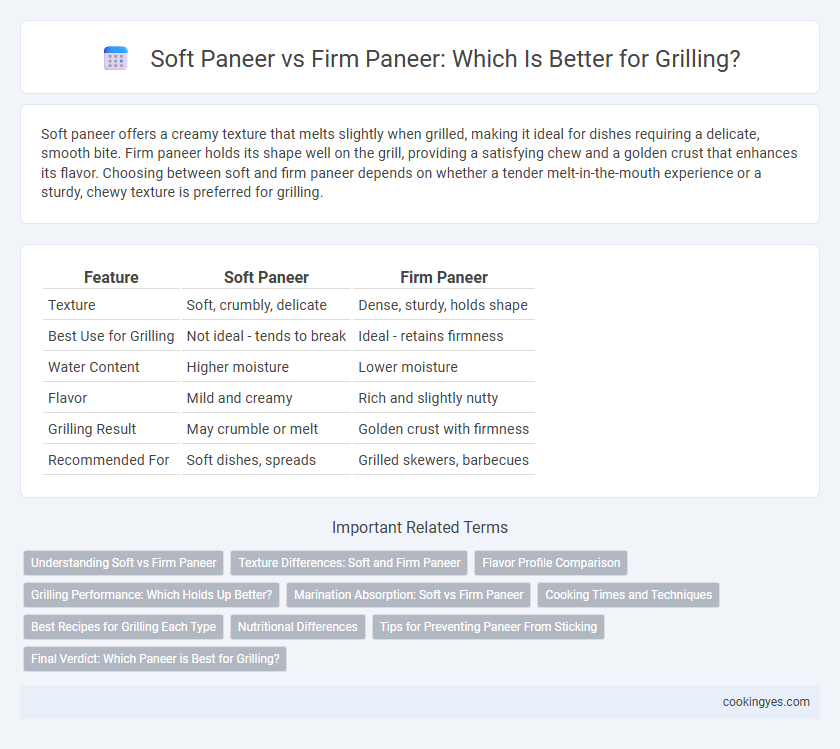Soft paneer offers a creamy texture that melts slightly when grilled, making it ideal for dishes requiring a delicate, smooth bite. Firm paneer holds its shape well on the grill, providing a satisfying chew and a golden crust that enhances its flavor. Choosing between soft and firm paneer depends on whether a tender melt-in-the-mouth experience or a sturdy, chewy texture is preferred for grilling.
Table of Comparison
| Feature | Soft Paneer | Firm Paneer |
|---|---|---|
| Texture | Soft, crumbly, delicate | Dense, sturdy, holds shape |
| Best Use for Grilling | Not ideal - tends to break | Ideal - retains firmness |
| Water Content | Higher moisture | Lower moisture |
| Flavor | Mild and creamy | Rich and slightly nutty |
| Grilling Result | May crumble or melt | Golden crust with firmness |
| Recommended For | Soft dishes, spreads | Grilled skewers, barbecues |
Understanding Soft vs Firm Paneer
Soft paneer has a higher moisture content, making it ideal for dishes requiring quick cooking or crumbling, but it tends to break apart on the grill. Firm paneer contains less water and holds its shape better under high heat, making it the preferred choice for grilling and skewering. Understanding the texture differences between soft and firm paneer ensures better cooking outcomes and optimal flavor absorption.
Texture Differences: Soft and Firm Paneer
Soft paneer boasts a creamy, tender texture that easily breaks apart while grilling, making it ideal for marinating or dishes requiring a melt-in-the-mouth feel. Firm paneer exhibits a dense, resilient texture that holds its shape well under high heat, providing a satisfying bite perfect for skewers and grilling without crumbling. The texture difference between soft and firm paneer significantly influences cooking techniques and dish outcomes, with soft paneer offering smoothness and firm paneer delivering structure.
Flavor Profile Comparison
Soft paneer offers a creamy texture with a mild, milky flavor that absorbs marinades quickly, enhancing its taste during grilling. Firm paneer maintains its shape better on the grill, delivering a denser bite with a slightly nutty and buttery flavor profile. The choice between soft and firm paneer impacts the balance of texture and flavor intensity in grilled dishes.
Grilling Performance: Which Holds Up Better?
Soft paneer tends to crumble and lose its shape easily when grilled, making it less suitable for high-heat cooking. Firm paneer maintains its texture and firmness under direct flame, ensuring a consistent grilling experience without disintegrating. For grilling performance, firm paneer holds up better, providing a perfect balance of crisp exterior and soft interior.
Marination Absorption: Soft vs Firm Paneer
Soft paneer absorbs marinades more effectively due to its porous texture, allowing flavors to penetrate deeply and enhance taste during grilling. Firm paneer, with a denser structure, absorbs marinades more slowly, resulting in a milder flavor profile but holds its shape better on the grill. Choosing between soft and firm paneer depends on the desired balance between intense marination and structural integrity for grilling dishes.
Cooking Times and Techniques
Soft paneer requires gentle handling and shorter cooking times, typically grilling for 2-3 minutes per side to prevent crumbling, making it ideal for delicate dishes. Firm paneer withstands higher heat and longer grilling, around 4-5 minutes per side, enabling a crispy exterior without losing shape. Techniques such as marinating firm paneer enhance flavor absorption while soft paneer benefits from minimal flipping to maintain texture during grilling.
Best Recipes for Grilling Each Type
Soft paneer retains moisture and tenderness, ideal for grilling in recipes like spiced paneer tikka or marinated cottage cheese skewers; it absorbs flavors well but requires gentle handling to prevent crumbling. Firm paneer maintains shape under high heat, making it perfect for grilling as cubes in kebabs, stuffed paneer sandwiches, or crispy paneer slabs with robust marinades. Both types excel in different recipes, with soft paneer suited for delicate, flavor-infused dishes, while firm paneer offers a hearty texture for charred, smoky preparations.
Nutritional Differences
Soft paneer contains higher moisture content, resulting in a creamier texture and slightly lower protein concentration compared to firm paneer. Firm paneer has reduced water content, increasing its protein density and making it more suitable for grilling due to better structural integrity. Nutritionally, firm paneer provides more protein per serving, while soft paneer offers a richer calcium content because of its delicate curd formation.
Tips for Preventing Paneer From Sticking
Soft paneer tends to be more delicate and prone to sticking when grilling compared to firm paneer, which holds its shape better and withstands heat without crumbling. To prevent sticking, marinate the paneer with oil and spices, and ensure the grill or pan is well-oiled and preheated thoroughly before placing the paneer on it. Using firm paneer and applying a light coating of oil on the surface helps create a protective barrier, resulting in perfectly grilled pieces without sticking.
Final Verdict: Which Paneer is Best for Grilling?
Firm paneer is best for grilling due to its dense texture, which holds shape well under high heat without crumbling or melting. Soft paneer tends to break apart on the grill, making it difficult to cook evenly and resulting in a less desirable texture. For optimal grilling results, firm paneer ensures a crispy exterior while maintaining a creamy interior.
Soft Paneer vs Firm Paneer for grilling Infographic

 cookingyes.com
cookingyes.com